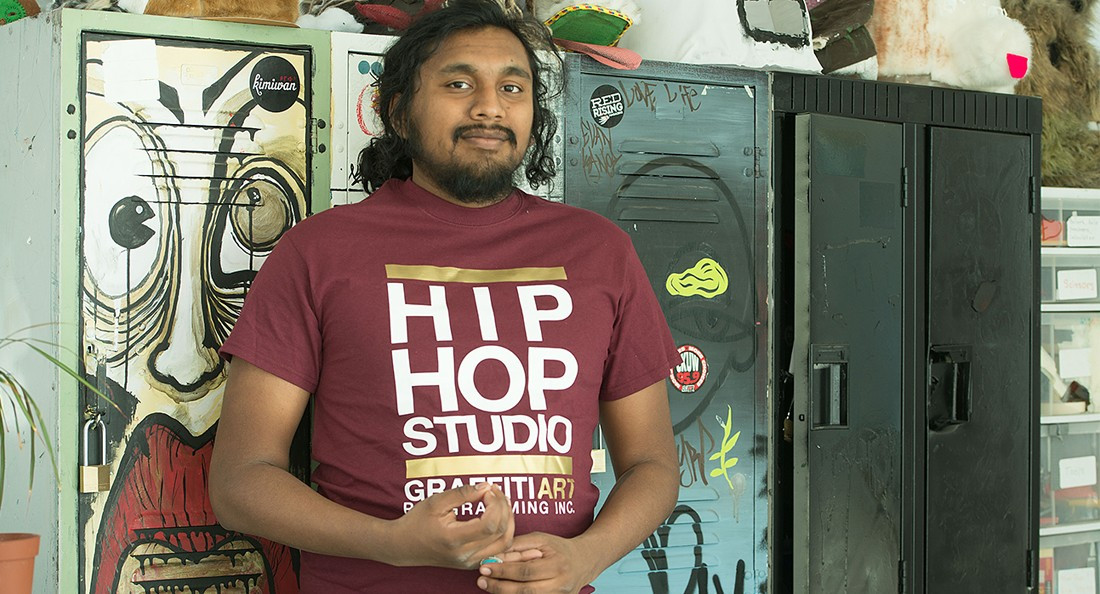Rocking out from a young age
All-ages venues are integral to growing up
Young musicians benefit greatly from taking part in the music scene.
“If we don’t start exposing youth to live music in events at an early age, it’s not going to be something that they … make part of their daily lives,” Erick Casselman, owner of The Park Theatre, says.
The Park Theatre is among a handful of local all-ages venues where parents can bring their children to experience shows, or where teenagers can go catch live music.
Venues don’t need to be dry to be welcoming for youth. The Park Theatre and the West End Cultural Centre (WECC) are both licensed for liquor sales, while hosting all events without age restrictions.
Some may have concerns that having youth in a licensed establishment might lead to underage drinking. However, Casselman says there is no reason why younger people should not be able to attend shows. At The Park Theatre, the bartenders are asked to check ID every time a patron orders a drink.
Similarly, the WECC checks ID at the doors and has different stamps for minors and people of age, as well as different styles of cups for alcohol and non-alcoholic beverages.
The WECC’s mission is to provide access to music and the arts. According to their executive director, Jason Hooper, having all-ages shows is one less barrier.
“We often see people bringing their kids,” Hooper says. “Sometimes they’re between six and 10, and sometimes they’re tweens. It’s kind of cool to see parents bringing their kids out to shows, sharing that passion for music.”
Hooper says that aside from instilling musical appreciation, attending live shows gives youth the idea that being a professional musician is possible.
“If you’re not exposed to it growing up, it seems like something very far away, outside of the realms of possibility for you,” he says. He explains that interacting with artists also breaks down this element of unattainable mythology.
The WECC is volunteer-run, which means that young people can also get involved in the music scene by volunteering.
Hooper believes that the all-ages policy creates a space for young people to experiment with performing.
The WECC has acoustic nights open to youth as well, and Hooper hopes to bring back matinee shows in the punk genre.
Dana Lance is a dancer at Studio 393, a youth-led arts studio organized by Graffiti Art Programming. Recently, Lance has been helping organize shows.
“I think it’s very important because it inspires other youth,” she says about all-ages shows. Lance says that young people have the opportunity to see that performing is feasible for them.
Lance says all-ages shows inspire a wider demographic, which is more representative of the community.
“I feel that it’s really important cultivating a community where other artists are appreciated but also have support from fans as well,” she says.
Osani Balkaran, a performer and behaviour manager at Studio 393, says that it’s good to get into the music scene at a young age.
“The more that you set goals and the more you accomplish them, the bigger the performances get and the more you learn along the way,” he says.
Balkaran got involved in the program at the age of 12. He says he’s learned many important skills over the years, including setting goals, public speaking and how to plan ahead. He says that the practice of these skills at a young age strengthens the neurological pathways in the brain.
“If you have that knowledge from when you’re younger, and you just keep doing it, it’s a good way to develop,” he says.
Balkaran explains that his involvement with Studio 393 has allowed him not only to express himself, but also to listen to other performers and learn from them as well.
Balkaran says that young people are affected by many policy changes in their community.
“We need a space to sort of talk about changes in policy and how it affects us. Even if we don’t say it like that, we’re talking about something bigger, something that affects us through our daily lives,” he says.
He says it’s important for older people to hear the messages youth have to share.
“It’s important for us to feel listened to and heard, and the more you have that symbiotic relationship going on, it just creates a new ground, new territory for people,” Balkaran says.
“Music can be translated into so many different things, and whether it’s like if you like creating music, there’s always ways to get involved in the scene and get involved in art,” Balkaran says.
According to Sean McManus, executive director at Manitoba Music, the changes in liquor laws in the past few years have opened up the option for venues to have better access to young people.
McManus explains that one of the issues with keeping a dedicated all-ages events centre open is that music venues tend to rely in part on liquor sales. Casselman disagrees, explaining that having a wide demographic means that many of the patrons that are of age will keep the bar busy.
McManus says that the health of the music scene is maintained by young people constantly entering the scene and growing with it. Having an all-ages event means that the audience demographic will be more varied.
“A huge part of the development of a scene is people start playing music when they’re young,” McManus says. “(H)aving opportunities to play in front of audiences is such a huge part of developing as an artist.”
He explains that even being involved in the culture by being part of the audience is integral to building a musical community.
Casselman says that the longevity of the music industry is ensured by young participants.
“In the long run, you’re building your fan base,” Casselman says.
Published in Volume 72, Number 24 of The Uniter (April 5, 2018)







